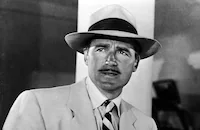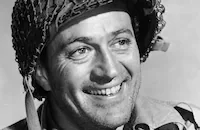Quebec
Cast & Crew
George Templeton
John Barrymore Jr.
Corinne Calvet
Barbara Rush
Patric Knowles
John Hoyt
Film Details
Technical Specs

Synopsis
In 1837, in the countryside of British-controlled Lower Canada, English soldiers search for Charles Douglas, the fugitive leader of the Voyageurs, a ragtag band of revolutionaries. With the help of his cohorts, Charles outsmarts the soldiers, then he and his grown son Mark go to the city of Quebec to see the secret head of the rebellion, La Fleur. Unknown to Mark, La Fleur is actually Stephanie Durossac, Charles' former lover and the estranged wife of Colonel Jean Durossac, a rabid, vengeful opponent of the rebellion. Mark is also unaware that Stephanie is his mother, and when Charles informs Father Antoine, a sympathetic Quebec priest, that he is taking Mark to see La Fleur, Father Antoine expresses concern for the young man. Stephanie, meanwhile, confers with Jean-Paul Racelle, an assemblyman, about a pro-revolutionary speech he is to deliver to his fellow politicians. The fanatical Racelle exhorts the assembly to reject British rule and announces that Charles is dead. Later, Stephanie is stunned by the appearance of her son, who was taken away from her at birth, while Mark is startled to learn that La Fleur is a beautiful woman. Stephanie, who became a revolutionary to spite her cruel husband, admits that she instructed Racelle to start the rumor about Charles' death, hoping that the news would inspire an uprising. At Stephanie's urging, Charles, Mark and their men ambush a squad of English soldiers who are transporting some captured rebels along the Rock River, and after a fierce fight, free their cohorts. Mark, who is posing as a coachman, then reports to Stephanie, and after she hears him describe the viciousness of the battle, she arranges for him to move in with her, but conceals her maternal concern. Mark adapts quickly to city life, and an attraction between him and Stephanie's grown ward Madelon, whose father was killed fighting the British, soon develops. Although Charles knows that the Voyageurs are too undisciplined and ill-equipped to defeat the English, he and the other revolutionaries, including a court-martialed British officer and Racelle, plot their next attack. As part of the plan, two hundred Voyageurs are smuggled into tunnels beneath The Citadel, a Quebec fortress controlled by the British, while other rebels prepare to confront troops along the river. Mark, meanwhile, evokes the jealous ire of Madelon when he admits that he is strangely attracted to Stephanie. Despite his confusion, Mark, who is also loved by a peasant girl named Jeannine, reassures Madelon with a kiss. Eventually the riverside battle takes place, and although Racelle is killed and the rebels are driven back into the woods, the British are shaken. Charles then sneaks into Father Antoine's church, where Stephanie assures him that she married the colonel only because he had told her that Charles was dead and she was unaware that she was pregnant with Mark. Before sending Mark back to the countryside, Charles and the priest tell him about how his mother used to compare Canada to an iron rose, whose petals could not be torn off. To Charles' surprise, Colonel Durossac then summons him and offers the Voyageurs amnesty in exchange for his surrender. Charles agrees and the colonel informs him that he is free to go. Later, however, Stephanie receives Charles' dead body rolled up in a rug and, crying, tells Mark the sad news. Enraged, Mark decides to lead the attack against the Citadel and sneaks into the tunnels to organize the men there. In the countryside, Jeannine, meanwhile, helps to gather the surviving Voyageurs, who head toward Quebec in canoes. When the British begin firing cannons at the canoes, Mark instructs the men in the tunnels to charge, and another bloody battle ensues. Jeannine is captured and killed by the colonel after she refuses to identify Mark, and Mark is wounded. Humbled by the rebels' defeat, Stephanie decides to ask the colonel for amnesty for Mark. She then tells her son not to give up hope, as Canada is like an iron rose, and with those words, Mark finally realizes that Stephanie is his mother. The colonel agrees to grant Mark amnesty and instructs Stephanie to have her son walk out of the Citadel gates and not stop when the guards call out to him. That night, when a manly figure walks past them without stopping, the Citadel guards open fire, then discover that they have a killed a disguised Stephanie. Later, in the church, Mark lights two candles for his parents and heads off with the devoted Madelon by his side.

Director
George Templeton
Cast

John Barrymore Jr.

Corinne Calvet

Barbara Rush

Patric Knowles

John Hoyt

Arnold Moss

Don Haggerty

Patsy Ruth Miller
Howard Joslin
Paul Guevrement
Adrian Belanger
Jacques Champagne
Rene Constantineau
Marcel Sylvain
Rolland Joseph Beaudet
Nikki Duval
Crew
Frank Baur
Bill Faralla
Ernst Fegte
Gene Garvin
Robert Goodstein
W. Howard Greene
Alan Le May
Alan Lemay
Harry Lindgren
Byron Munson
Jack Ogilvie
Morgan Padelford
Edward Plumb
Irving Talbot
Van Cleave

Film Details
Technical Specs

Quotes
Trivia
Notes
Alan LeMay's onscreen credit reads: "Written and produced by Alan LeMay." Voice-over narration, spoken by Patric Knowles as his character, "Charles Douglas," is heard intermittently throughout the first half of the picture. The film's onscreen credits include the following written statement: "Because certain historical events and personalities are still controversial, this story is told in terms of fictitious characters and action." In 1837, Louis Joseph Papineau, a Lower Canada assemblyman, organized an effort to seize control of the British-dominated executive council, and later he and his mostly French-Canadian followers, called the Patriotes, clashed with the British army. Papineau's rebellion was easily quashed, as was a smaller rebellion in Upper Canada, led by William Lyon Mackenzie. Unlike the revolutionaries in the film, the real rebel leaders fled to the United States after their defeats.
Paramount borrowed Corinne Calvet from Hal Wallis' company for the production. The film marked the debut of French-Canadian actress Nikki Duval and was her only appearance in an American production. As noted by reviews and studio publicity material, the film was shot entirely in Quebec Province, including the moated Citadel, Montmorency Falls and the House of Parliament in Quebec City, the Plains of Abraham, a three-hundred-year-old farm on the Isle D'Orleans, and the Governor-General's summer home. According to studio publicity, members of the Canadian Army's Royal 22nd Regiment appeared in the Citadel battle scene.












